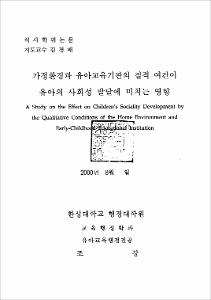가정환경과 유아교육기관의 질적 여건이 유아의 사회성 발달에 미치는 영향
- Files in This Item:
-
-
Download
 000000066047.pdf
기타 데이터 / 2.01 MB / Adobe PDF
000000066047.pdf
기타 데이터 / 2.01 MB / Adobe PDF
-
Items in Repository are protected by copyright, with all rights reserved, unless otherwise indicated.
 000000066047.pdf
기타 데이터 / 2.01 MB / Adobe PDF
000000066047.pdf
기타 데이터 / 2.01 MB / Adobe PDFItems in Repository are protected by copyright, with all rights reserved, unless otherwise indicated.